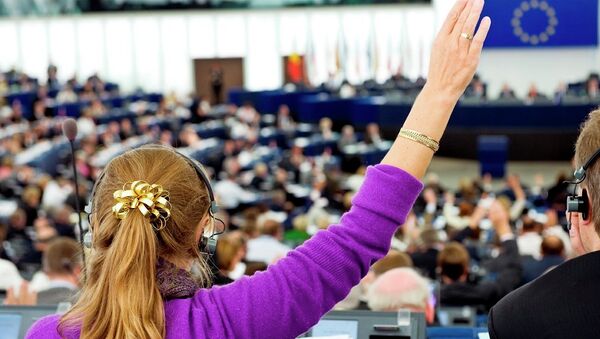The huge EU-US trade deal should deepen EU access to the US market, but must not undermine EU standards or the right to regulate in the public interest, say Trade Committee MEPs in draft recommendations on the TTIP and due to be confirmed by the entire plenary by vote on June 10. The European Parliament holds the power to approve or veto the final trade agreement.
There is deep disagreement over the use of the controversial Investor-State Dispute Settlement (ISDS) scheme, which allows companies in one country to sue governments in another country if an investment fails.
Boo! European Parliament Trade Committee just voted for ISDS in TTIP. Important to email MEPs before June 10 http://t.co/7tHcRNb02X #NoTTIP
— Global Justice Now (@GlobalJusticeUK) May 28, 2015
With an ISDS system in place, corporations would be able to challenge governments in a private trade tribunal. There are concerns that such a system would give companies excessive power over national authorities and allow them to sue governments every time legislation was introduced that might harm their profits.
One example is the pharmaceutical company Eli Lilly and Company, which is demanding $100 million as compensation for what it calls "expropriation" by Canada, because the Canadian courts refused to grant Eli Lilly a drug patent on the grounds that it didn't satisfy the conditions set down in law for doing so.
#EPonTTIP vote earlier: #ISDS, #FTA, #TTIP, #CETA, #INTA…. Confused? Check our infographic https://t.co/WUotQs5HjC pic.twitter.com/kM1BQnXfRa
— European Parliament (@Europarl_EN) May 28, 2015
The highest monetary award in the history of ISDS — US $1.77 billion — was won by oil giant Occidental, which sued the Ecuadorian Government over the unilateral termination by the State of an oil contract.
"Dirty Little Secret"
Lori Wallach, director of Public Citizen's Global Trade Watch told the Huffington Post:
"The dirty little secret about [ISDS] is that it is not mainly about trade, but rather would target for elimination the strongest consumer, health, safety, privacy, environmental and other public interest policies on either side of the Atlantic."
"The starkest evidence… is the plan for it to include the infamous investor-state system that empowers individual corporations and investors to skirt domestic courts and laws and drag signatory governments to foreign tribunals."
Even Before #TPP & #TTIP U.S. Forced To Change Laws By Trade Agrmnts https://t.co/x3x84rDcMv #NoFastTrack @glynmoody pic.twitter.com/ITKarNAHuv
— Lori Wallach (@WallachLori) May 28, 2015
MEPs say a reformed ISDS under TTIP should employ a new system which should include a "permanent solution" with "publicly appointed, independent judges", "public hearings" and an "appellate mechanism", while respecting the jurisdiction of courts of the EU and its member states.
European trade commissioner Cecilia Malmström said the new ISDS plans were intended "to remove any ambiguity about sovereign governments' right to regulate, putting that in black and white".
MEPs copped out on #ISDS in #TTIP today but we will keep the pressure on for the plenary vote http://t.co/mm8LkzaZC3 pic.twitter.com/YSkxFwF5Jc
— Greens in the EP (@GreensEP) May 28, 2015
However, the European consumer rights group BEUC says the MEPs have fudged the issue.
Monique Goyens, BEUC's Director General, said: "Deplorably, the European Parliament took a very ambiguous stance on the infamous ISDS system. We have yet to see any facts justifying its inclusion in an EU/US trade deal.
"We hope MEPs when voting in plenary will demand the exclusion of this outdated, discriminatory and unneeded mechanism."


